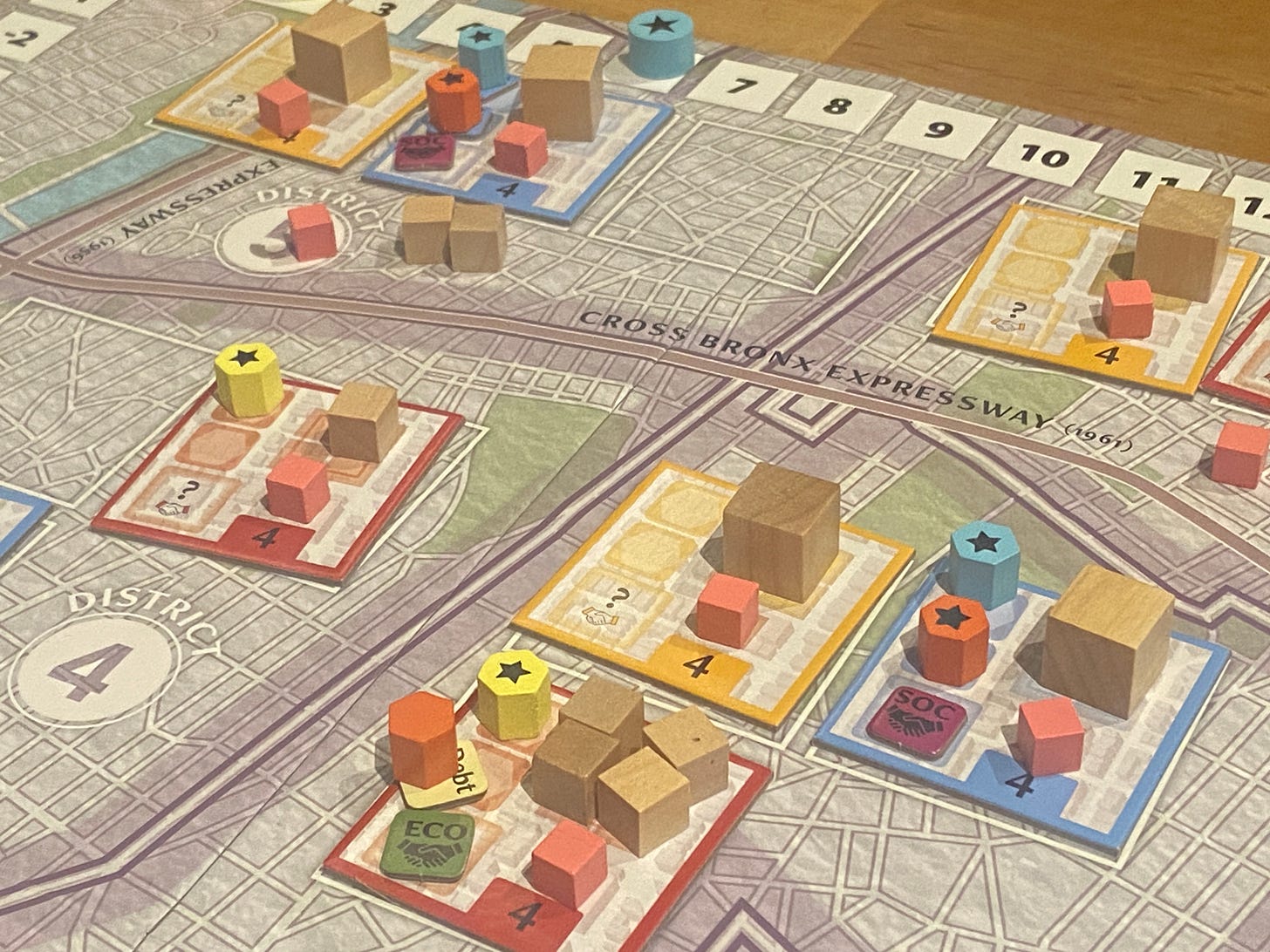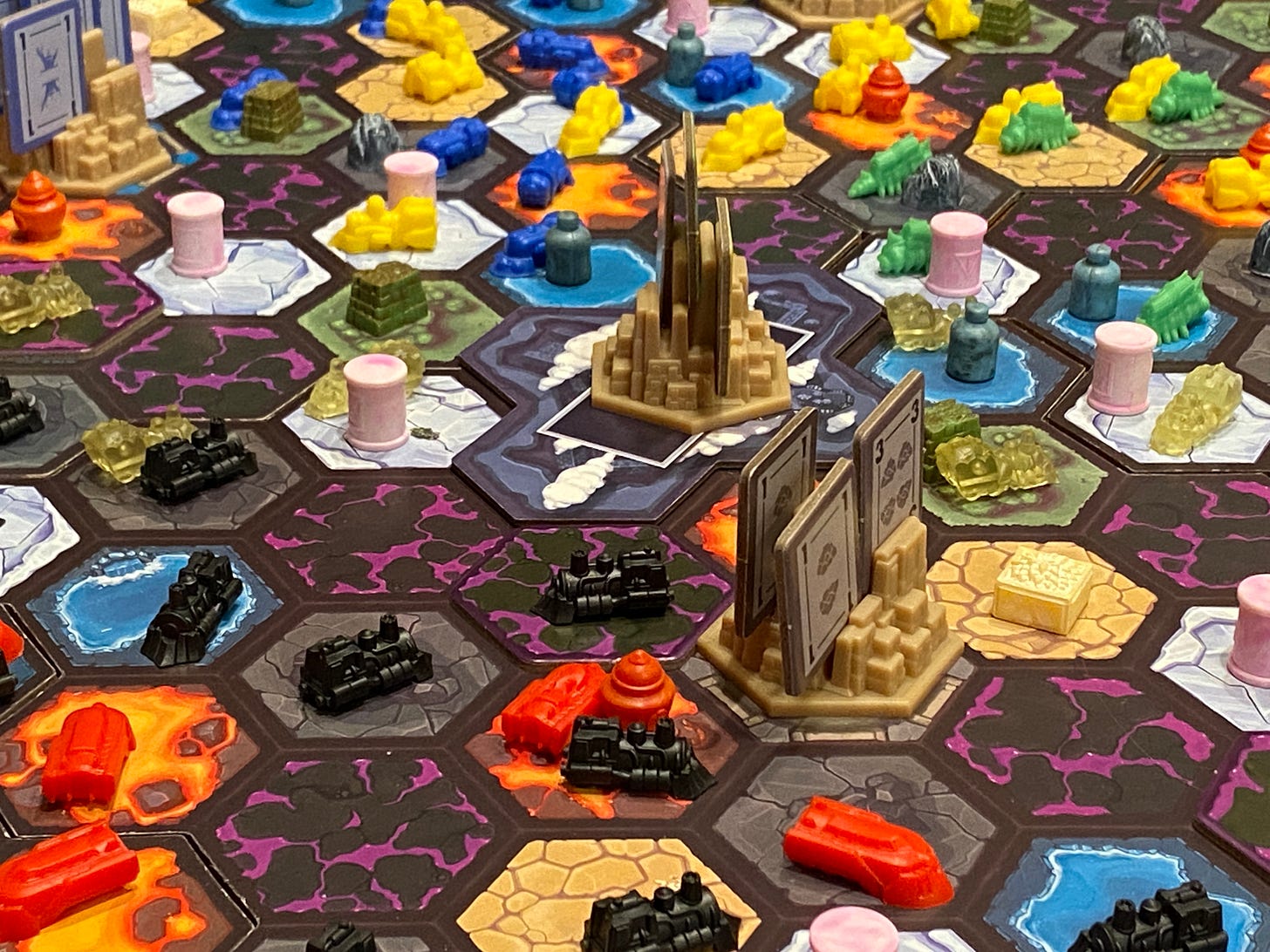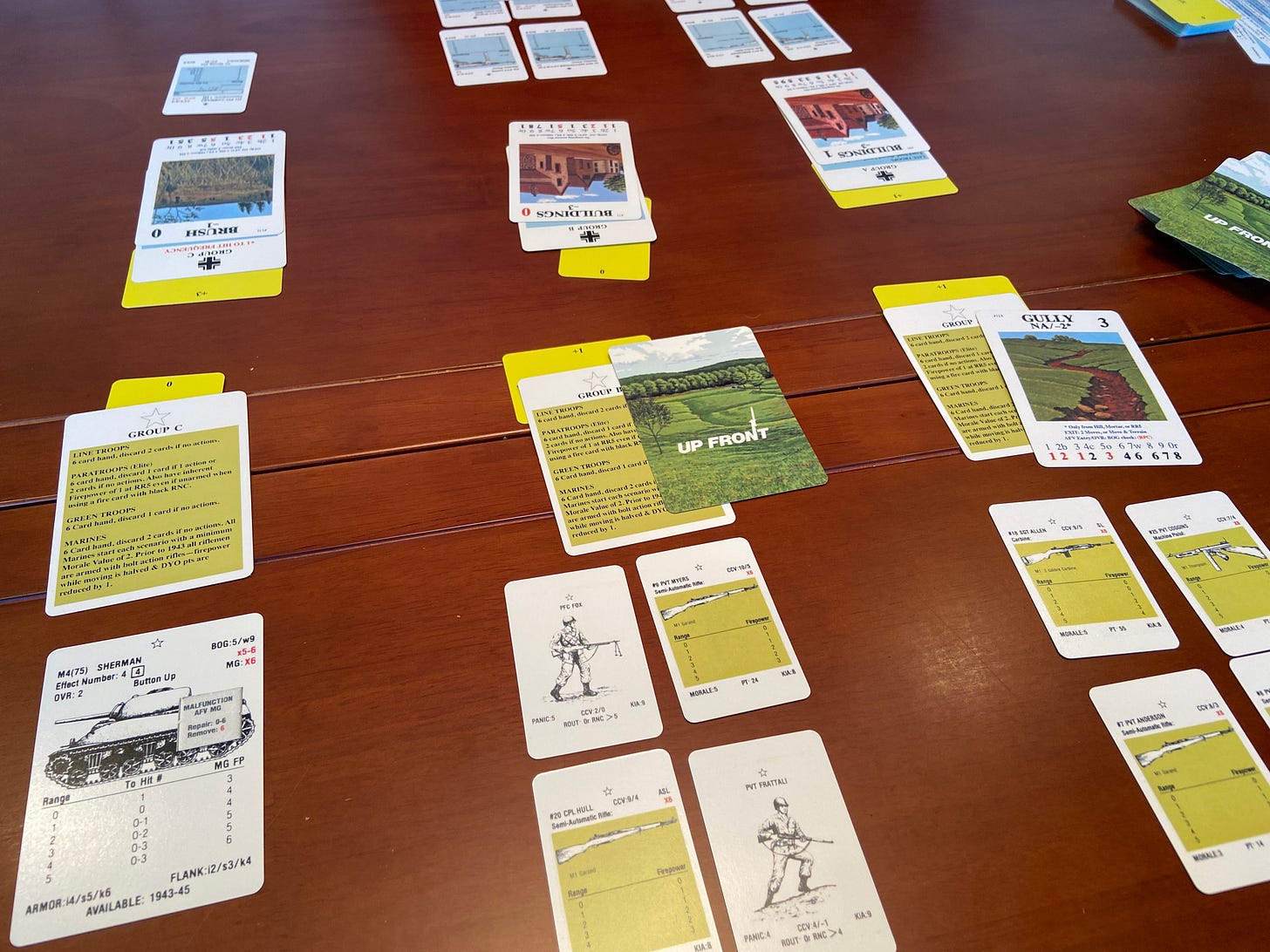Cross Bronx Expressway, Empyreal, Up Front
Week of October 13th, 2025
Apologies for being a little behind this week. I got swamped with concert stuff. Also, Cross Bronx Expressway turned out to be a lot harder to write about than I expected. So, speaking of which …
Cross Bronx Expressway (CBE) is GMT’s latest installment in their Irregular Conflicts Series (an offshoot of COIN). Given that, it may be surprising that I even played it — my feelings about COIN are mostly extremely negative. But, Gest of Robin Hood was alright, and someone at the Wednesday night Guildhouse group was looking for people to play CBE. I was also curious because it’s about a topic — the hollowing out of US cities — that is fascinating and critical to understanding US politics today, wrapped up as it is in the darkest and most deeply cruel and unjust aspects of America’s storied history. I’m willing to try any game that tackles something simultaneously as important and as challenging as this.
Mechanically, CBE is just another COIN game (sigh, ok, ICS) although it does have a number of improvements around the edges. The pacing and engagement are significantly improved with a tweaked turn structure. The actions you can take on your turn are much cleaner and more comprehensible; special actions have been eliminated (a big win structurally), the actions are relatively streamlined, and there are no complicated preconditions. The unforgiving requirements to sequence actions correctly, so prevalent in the other games, are mostly (mostly) gone. It has just 3 factions, and I think this tends to work a lot better than the standard 4 just for pacing reasons, and because most of these games really struggle to make an interesting and historically plausible 4th faction. The overall playability is good. It’s only about 1.5-2hr to play a standard 2-decade game, and while you wouldn’t want to teach it at the table, you could. That’s all good. At the end of the day though, we’re still stuck with the same game feel as COIN: actions are small and yet getting anything meaningful done requires like 4 steps and everything you do can be easily and quickly be undone, so it’s really hard to feel like anything meaningful is happening. Each of the factions has like 6 ways to score VPs and yet everything is so oblique that it’s sometimes hard to find anything to do that will make you progress towards anything. And all the mechanisms are so hopelessly abstract that it’s hard to engage with the setting.
And so we come to the thing about CBE that absolutely thwarts me. Criticism famously involves answering 3 questions: what the piece of art is trying to do, whether that is worthwhile, and whether it is successful. And I don’t know, not for sure, what the game is trying to do. It could be going in a couple directions. It could have the goals of a pretty traditional COIN/ICS game, which would lead me to one conclusion. Or, it could be a giant, easily-missed message to GMT’s predominately white, American, and middle-to-upper-income customer base: “Hey you. Yeah, you. You are the problem”. And I don’t really know how to tell.
I’m not from the South Bronx, but I am from Cleveland. I grew up in the suburb of Cleveland Heights, right next to the city proper. I, like Travis Kelce, am a proud graduate of Cleveland Heights High School (a significant distance apart in time, but still). Cleveland Heights is wedged in between wealthy Shaker Heights and the brutally redlined suburb of East Cleveland (the subject of the underrated Serial Season 3). Both Cleveland Heights and neighboring Shaker Heights have totally fascinating social histories because they both fought back against white flight and became among the vanishingly few examples in the US of communities that truly tried to integrate — albeit imperfectly — after the Civil Rights era. Shaker Heights’ approach was top-down while Cleveland Heights’ was bottom-up. When I was young I had no idea how unique the community I came from was, and I will be forever grateful for growing up there. It also means I have slightly more understanding of the issues facing marginalized communities than most white guys from the suburbs.
Superficially, the game portrays the problems faced by the South Bronx as complex. I don’t believe they were. It all boils down to just one thing: structural racism. Redlining, housing and lending discrimination, disinvestment, and of course the environmental racism of the Cross Bronx Expressway itself. Every time you think you’ve hit the bottom of racism in the US, you just have to keep going. This community never had a chance. It was all structural. It was deliberately starved of resources as a matter of explicit public policy. Nothing the players in the game could do in their roles of the Public, Private, or Community sectors could make that much of a difference.
And the game in fact may very well be saying this. The economics and the collective loss condition are so punishing that an extremely high degree of cooperation between the players seems to be required just to not lose — a level of cooperation that the mechanisms and structure of the game actively discourage. Is that the game’s thesis? I wish I could say for sure.
By publishing under a pseudonym, the designer has left us to puzzle out their intentions. I tend to think that this is in fact the thesis of the game. If so, though, I also think COIN/ICS was just not a great vehicle for it. A ton of people are not going to understand. We’ve now seen how games can both tackle difficult issues and still be highly engaging as games via John Company, Molly House, and Weimar. ICS/COIN is just too abstract, too oblique, too opaque, too sanitized to give the players the kind of clarity of vision or emotional response that is needed here.
Or I could be wrong. I honestly don’t know.
To my great chagrin, Empyreal has just been sitting there on the shelf for a while. It’s an impressively versatile game; it’s the only game on both of my “games that are specifically good for 3” and “games that are specifically good for 6” lists. And I mean look at it, who can not like a game with that riot of colors?
Why do I like it so much? It’s got that gonzo Level 99 flavor, even though it’s relatively restrained by the standards of Millennium Blades or Argent: The Consortium. What it delivers that those games can’t (even if they are also great) is that overly dramatic flavor that I enjoy in a package that is quite easy to teach and plays in a standard euro timeframe (90 minutes or so). The core systems of moving your conductor, activating your spellcars, and making deliveries are really clean. You then get a wide variety of powers and actions from the spellcars you add to your train and the couple of specialists you hire. In some sense it’s a tableau builder in the mold of Race for the Galaxy, but the way you build out your powers feels quite different. In Race, it’s all about building up a synergistic tableau of cards that amplify each other. In Empyreal, while you do want to build a focused suite of actions, it’s much less interlocking than Race and more of an exercise in balance and resource management. The core actions are really just building track, managing your mana pool, and making deliveries, with the rest being investments in doing those things better (adding spellcars, hiring specialists). Because this is Level 99 there are bits of flavorful chrome around the edges, but managing your tableau is a lot more intuitive and transparent than Race and you don’t need in-depth knowledge of the spellcar mix to play well.
Empyreal, like several other games that fall into this epic category for me (the aforementioned Argent: The Consortium, Edge of Darkness, Sidereal Confluence, Thunderstone Quest), is obviously a strong and niche flavor. You’re never going to pull this sucker out every week … but moreso than Argent or Edge of Darkness, I feel like you could if you wanted to.
This is Up Front, Scenario G — Block Clearing. To my mind, it is the most interesting of the “monster” scenarios for Up Front (G, H, and L). By monster, that means maybe 90 minutes to play instead of 30-60. Unfortunately, it’s also been plagued by some of the worst balance statistics in the system, with the defender having very little chance to win the standard matchups. A couple of years ago I rebuilt all the rosters to try to rebalance it, and I’ve been quite happy with the results for the most part. It’s almost impossible to build a sensible roster for the Soviets as the defender, but the other matchups work great. Again, it’s a very specific flavor — chaotic even by Up Front standards. As usual though the design team made a bunch of smart choices to make the big tanks feel daunting, but still with an emphasis on playability. In real history, no single German squad could stand up the firepower of a Sherman tank; trying to do so would have been insane. The game nudged things here and there to emphasize playability while retaining evocativeness. We had an intense back-and-forth duel between the Sherman and a panzerschreck team. The panzerschreck team was never going to survive that faceoff but they put several rounds on the Sherman, immobilizing it and buying enough space for the US to win on points. If you’d like a copy of the updated rosters, just DM me.
Coda
I think I’m pretty plugged in to the bass clarinet community in the US, but even in the globalized world that we live in stuff will come along out of Europe that I had no idea about. I only found out about this album of fun clarinet music because the clarinetist, Thomas Verity (principal clarinettist of the Welsh National Opera), is a lifelong friend of a clarinettist/pianist who I play with. Like a lot of contemporary music I enjoy, this album combines highly textural and impressionistic modern techniques while also having accessible melodic and dramatic elements.
That’s it for this week. Don’t forget to like and subscribe, share with your discerning gaming friends, and consider a paid subscription to support the work!





Thanks for the impressions on cross bronx. It IS hard to tell a story with COIN/ICS through in game play itself, I suspect you're right the real message is about structural racism factors pushing everyone against each other based on the politics of the designer. Sounds like a skip for me despite the aces subject matter.
Thanks for a fun, eclectic post. "I’m pretty plugged in to the bass clarinet community"!